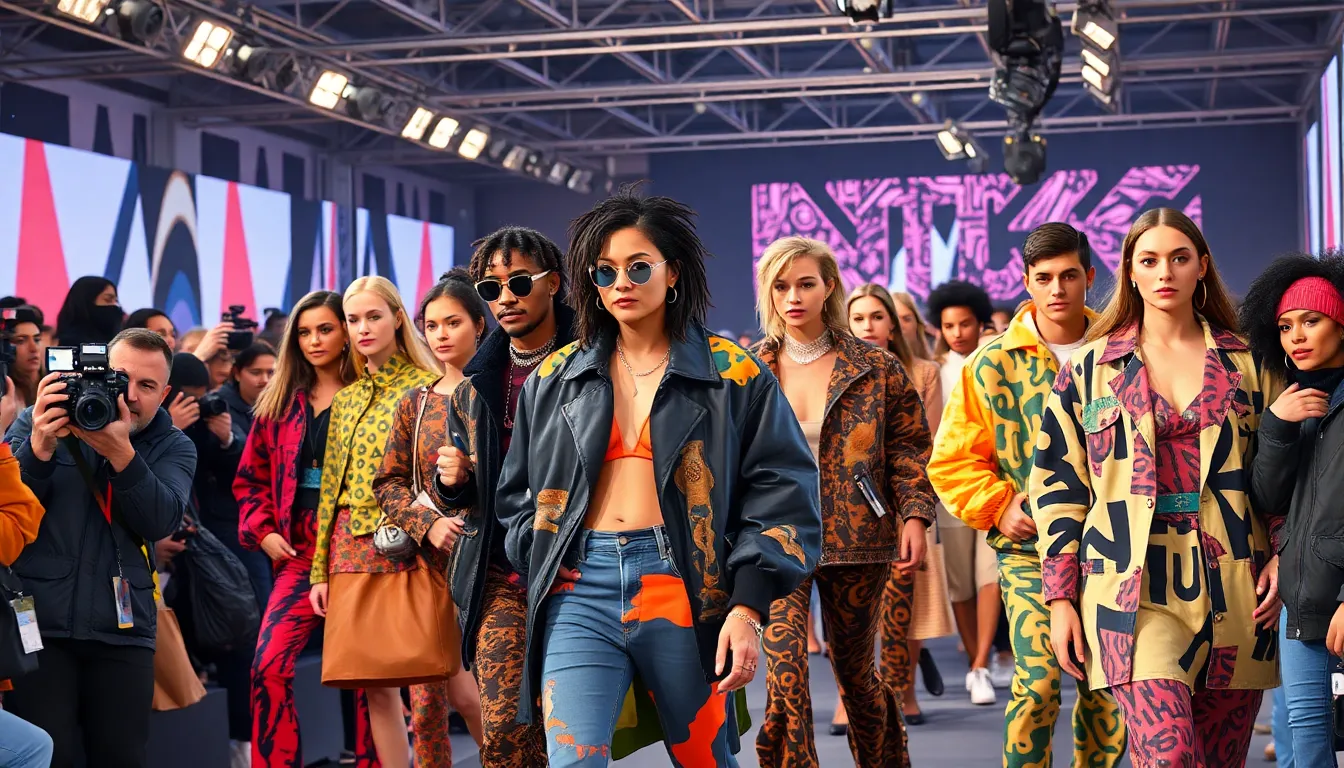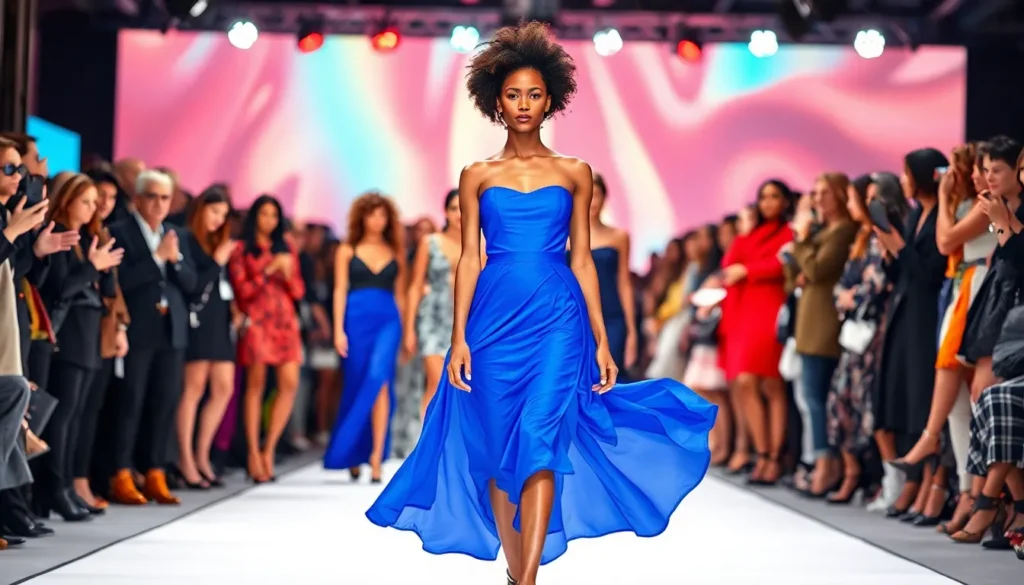Table of Contents
ToggleFashion weeks are the Super Bowls of style, where creativity struts down the runway and trends are born faster than you can say “new season.” From jaw-dropping designs to eye-popping accessories, these events showcase the best and boldest in the fashion world. They’re not just about clothes; they’re a cultural phenomenon that captures the essence of our times.
Overview of Fashion Weeks
Fashion weeks serve as essential platforms for designers to present their latest collections. Each event includes runway shows featuring garments that reflect current trends and future directions. Major cities like Paris, Milan, New York, and London host these prominent gatherings, showcasing the diversity and innovation in global fashion. Designers unveil their creations to industry insiders, buyers, and the media, setting the tone for upcoming seasons.
The cultural impact of fashion weeks extends beyond the runway. Styles exhibited influence everyday fashion choices and popular culture. Trends that emerge during these weeks often reach mainstream audiences through social media and celebrity endorsements. Events incorporate various elements, including aesthetic themes and artistic presentations, highlighting the interplay between fashion and art.
Fashion weeks also promote sustainability and inclusivity, addressing contemporary issues within the industry. Some designers embrace eco-friendly practices, creating collections from sustainable materials. Others focus on diverse models, ensuring representation across body types and backgrounds. This focus aligns with broader societal changes, reflecting values of modern consumers.
Audiences eagerly anticipate these events for glimpses of innovation and creativity. Influencers often cover the happenings live, sharing insights and generating conversations about the latest trends. The impact of fashion weeks reaches various sectors, influencing retail and marketing strategies for brands worldwide. Each season, the excitement builds as fashion week approaches, making it a notable highlight in the fashion calendar.
Major Fashion Weeks Around the World

Fashion weeks represent a global showcase of creativity and style. Major cities set the stage for designers to unveil collections that shape industry trends.
New York Fashion Week Highlights
New York Fashion Week features a dynamic mix of emerging designers and established brands. Streetwear continues to dominate the runway, reflecting urban culture. Bold colors and unique textures capture attention, with designers like Tory Burch and Michael Kors setting trends. Attendees experience lively presentations, often incorporating multimedia elements. Sustainability garners attention, with several collections highlighting eco-friendly materials. In addition, representation remains a priority, as diverse models showcase collections that resonate with a wider audience.
Paris Fashion Week Highlights
Paris Fashion Week embodies elegance and innovation, showcasing luxury fashion at its finest. Renowned designers such as Chanel and Louis Vuitton unveil meticulously crafted collections. Haute couture garners significant interest, as intricate designs and craftsmanship mesmerize attendees. Seasonal themes range from romanticism to modern minimalism, establishing key trends for the year. Sustainability initiatives take center stage, featuring eco-conscious brands committed to ethical practices. The city buzzes with excitement as influencers and media cover the event, expanding its reach beyond fashion enthusiasts.
Milan Fashion Week Highlights
Milan Fashion Week stands out for its sophisticated artistry and craftsmanship. Italian heritage influences renowned houses like Gucci and Prada, emphasizing luxury materials and design excellence. Collections frequently showcase a blend of traditional and contemporary styles, appealing to various tastes. Iconic runway shows captivate audiences with theatrical presentations. Inclusivity emerges in casting, as numerous models across all backgrounds grace the catwalk. Sustainability drives innovation, prompting brands to adopt eco-friendly approaches in fabric selection and production methods.
London Fashion Week Highlights
London Fashion Week celebrates diversity and avant-garde aesthetics. Up-and-coming designers challenge conventions, creating a vibrant atmosphere for creativity. Collections reflect eclectic themes, ranging from punk influences to modern tailoring. Groundbreaking use of textiles captivates attention, with designers like Burberry leading the way. Industry conversations highlight the importance of inclusivity and representation on the runway. Additionally, digital innovation plays a crucial role, with virtual shows expanding global accessibility for fashion enthusiasts.
Notable Trends from Fashion Weeks
Fashion weeks showcased a variety of trends that captured attention. From vibrant colors to innovative fabrics, each season brought fresh perspectives.
Color Trends
Bold colors dominated the runways, echoing a desire for optimism. Bright hues like electric blue and vivid orange emerged as favorites, reflecting a shift towards exuberance. Designers incorporated these colors into everyday wear, ensuring accessibility. Earthy tones also gained traction, highlighting a connection to nature and sustainability. Pastel shades maintained popularity, providing a softer palette, especially in spring collections. Various combinations of these colors encouraged experimentation in styling, engaging fashion enthusiasts seeking uniqueness.
Fabric Innovations
Innovative fabrics took center stage, transforming the way designers approached their collections. Textiles that incorporate recycled materials emphasized sustainability, aligning with modern consumer values. Some collections featured tech-integrated fabrics, offering functionality alongside aesthetics. Lightweight materials showcased dynamic movement on the runway, captivating viewers’ attention. Textures, such as velvet and leather, added depth to styles, combining comfort with luxury. The use of breathable fabrics continued as a focus, supporting everyday wear without sacrificing elegance.
Influential Designers
Designers significantly shaped current fashion trends, each contributing their distinct vision. Renowned names like Balenciaga and Gucci prominently influenced the industry, melding bold creativity with tradition. Emerging talents such as Nensi Dojaka brought fresh perspectives, highlighting individuality through unique silhouettes. Sustainability advocates like Stella McCartney pushed the boundaries of eco-friendly fashion, integrating principles into avant-garde designs. These creators interacted with the audience through social media, fostering a sense of community. Each designer’s collection reflected broader societal values, addressing issues like diversity and environmental consciousness.
Celebrity Influence on Fashion Weeks
Celebrities significantly shape trends during fashion weeks. Their presence on the runway and in the audience garners media attention, creating a buzz that elevates designers and collections. Iconic figures like Rihanna and Zendaya often wear pieces that become instant must-haves. Media outlets showcase their choices, amplifying visibility for both stars and designers.
Fashion collaborations with celebrities also play a crucial role. Collaborations leverage celebrity brands and personalities, making fashion more accessible to the masses. For instance, the partnership between Adidas and Beyoncé has drawn attention to both the brand and the artist’s aesthetic. These alliances often generate significant sales spikes and online engagement.
Social media extends celebrities’ influence beyond physical events. Influencers and stars sharing their outfits and experiences on platforms like Instagram create trends that ripple through consumer purchasing habits. Designers gain widespread visibility as their collections are featured in celebrity posts, expanding their audience reach.
High-profile front-row attendees also impact fashion week dynamics. Celebrities in the front row can dictate which shows receive the most media coverage and public interest. Their appearances often lead to increased social media interactions, driving conversations around specific collections and styles.
Sustainability is also influenced by celebrity advocacy. Many celebrities are aligning with eco-conscious brands, promoting sustainable fashion choices to their followers. This shift encourages consumers to consider ethical implications when making purchases, further aligning fashion weeks with contemporary cultural values.
Overall, celebrity influence during fashion weeks continuously evolves, reflecting societal trends and consumer interests. Their roles as trendsetters and advocates shape the industry’s direction, ensuring that fashion weeks remain relevant in a fast-changing world.
Fashion weeks are more than just showcases; they are dynamic reflections of society’s evolving values and aspirations. As designers push boundaries and embrace sustainability, the industry adapts to meet the demands of modern consumers. The vibrant energy of these events not only sets trends but also fosters a sense of community among fashion enthusiasts.
With the influence of social media and celebrity endorsements, fashion weeks continue to shape everyday style choices. The excitement surrounding these events promises to keep them at the forefront of the fashion landscape, driving innovation and inclusivity for seasons to come. As the world watches, the impact of these gatherings will undoubtedly resonate far beyond the runway.



